- Home
- Peter Carey
The Fat Man in History aka Exotic Pleasures Page 4
The Fat Man in History aka Exotic Pleasures Read online
Page 4
She arranges the dolls in unexpected places. So that, walking up the stairs a little drunk, one might be confronted with a collection of bald white dolls huddled together in a swarm. Her room, which was once my room, she has painted white; the babies merge into its walls and melt into the bedspread which is also white. White, which has become a fashionable colour of late, has no appeal to her, it is simply that it says nothing, being less melodramatic than black.
I must admit that I loathe white. I would prefer a nice blue, a pretty blue, like a blue sky. A powder blue, I think it is called. Or an eggshell blue. Something a little more feminine. Something with-what do you call it-more character about it. When I finally take her to bed (and I am in no hurry, no hurry at all) I will get some better idea of her true colour, get under her skin as it were.
Did you get the pun?
I have found her, on numerous occasions, playing Monopoly in the middle of her room, drinking Guinness, surrounded by white dolls.
Several times a week she comes to wash my dishes and to be persuaded to share a meal with me. The consumption of food is, for the moment, our most rewarding mutual occupation. We discuss, sometimes, the experience of the flavours. We talk about the fish fingers or the steak and kidney pies from Marks & Sparks. She is still shy, and needs to be coaxed. She has revealed to me a love for oysters which I find exciting. Each week I put a little of my pension aside. When I have enough I will buy oysters and we will discuss them in detail. I often think of this meal.
At an earlier stage I did not understand myself so well, and achieved, on one or two occasions, a quiet drunken kiss. But I have not pursued the matter, being content, for the moment, with the meals and the company on these quiet nights now that the television has been taken away and now that I, unemployed, have so little money to spend with the ladies in Bayswater, the cinema, or even a pint of best bitter in the Bricklayers Arms which, to tell the truth, I always found dull.
I am in no hurry. There is no urgency in the matter. Sooner or later we shall discuss the oysters. Then it will be time to move on to other more intimate things, moving layer after layer, until I discover her true colours, her flavours, her smells. The prospect of so slow an exploration excites me and I am in no hurry, no hurry at all. May it last forever.
Let me describe my darling. Shall I call her that? An adventure I had planned to keep, but now it is said. Let me describe her to you. My darling has a long pale face with long golden hair, slightly frizzy, the kind with odd waving pieces that catch the light and look pretty. Her nose is long, downwards, not outwards, making her appear more sorrowful than she might be. Her breasts, I would guess, are large and heavy, but she wears so many sweaters (for want of a better term) that it is hard to tell; likewise the subtleties of her figure. But she moves, my darling, with the grace of a cat, pacing about her room surrounded by her white dolls and her Monopoly money.
She seems to have no job and I have never asked her about her occupation. That is still to come, many episodes later. I shall record it if and when it is revealed. For the moment: she keeps no regular hours, none that I can equate with anything. But I, for that matter, keep no regular hours either and, never having owned a clock, have been timeless since the battery in the transistor radio gave out. Normally it seems to be late afternoon.
She is making up her mind. I can hear her at the top of the stairs. Twice, in the last few minutes, she has come out on to the landing and then retreated back into her room. She has walked around her room. She has stood by the window. Now she moves towards the landing once more. She is there. There is a silence. Perhaps she is arranging dolls on the landing.
No. She is, I think, I am almost positive, descending the stairs, on tip-toe. She plans to surprise me.
A tap at the door. My stomach rumbles.
I move quickly to the door and open it. She says hello, and smiles in a tired way.
She says, phew. (She is referring to the smell of the bad milk in the unwashed bottles.)
I apologize, smooth down my bed, pull up the cover, and offer her a place to sit. She accepts, throwing my pyjama pants under the bed for the sake of tidiness.
She says, how is your situation.
I relate the state of the employment market. But she, I notice, is a little fidgety. She plays with the corner of the sheet. She is distracted, appears to be impatient. I continue with my report but know she is not fully listening.
She leaves the bed and begins to wash up, heating the water on the small gas heater. I ask her of her situation but she remains silent.
The water is not yet hot enough but she pours it into the tub and begins to wash up, moving slowly and quickly at the same time. I dry. I ask her of her situation.
She discusses George who I am unsure of. He was possibly her husband. It appears there was a child. The child she visits every third Sunday. For the hundredth time I remark on how unreasonable this is. The conversation tells neither of us anything, but then that is not its purpose. The dishes she dispenses with quickly, an untidy washer, I could do better myself-she leaves large portions of food behind on plates, bottles, and cutlery, but I do not complain-I keep the dishes to attract her, like honey.
I relate a slightly risqué joke, a joke so old it is new to her. She laughs beautifully, her head thrown back, her long white throat like the throat of a white doll, but soft, like the inside of a thigh. Her throat is remarkable, her voice coming softly from it, timorously, pianissimo.
She is, how to call it, artistic. She wears the clothes of an ordinary person, of a great number of quite different ordinary persons, but she arranges them in the manner of those who are called artistic. Small pieces of things are tacked together with a confidence that contradicts her manner and amazes me. Pieces of tiny artificial flowers, a part of a butcher’s apron, old Portuguese boots, a silver pendant, medal ribbons, a hand-painted stole, and a hundred milk bottle tops made unrecognizable. She is like a magpie with a movable nest.
Her name, which I had earlier decided not to reveal, is Nile. It is too private a name to reveal. But it is so much a part of her that I feel loath to change it for fear I will leave something important out. Not to mention it would be like forgetting to mention the white dolls.
The washing-up is finished and it is too early yet to prepare a meal. It is a pleasant time, a time of expectation. It needs, like all things, the greatest control. But I am an expert in these matters, a man who can make a lump of barley sugar last all day.
We sit side by side on the bed and read the papers. I take the employment section and she, as usual, the deaths, births, and marriages. As usual she reads them all, her pale nail-bitten finger moving slowly over the columns of type, her lips moving silently as she reads the names.
She says, half to herself, they never put them in.
I am at once eager and reluctant to pick up this thread. I am not sure if it is a loose thread or one that might, so to speak, unravel the whole sweater. I wait, no longer seeing the words I am looking at. My ear drums are so finely stretched that I fear they may burst.
She says, don’t you think they should put them in?
My stomach rumbles loudly. I say, what? And find my voice, normally so light, husky and cracked.
She says, babies… abortion babies… they’re unlisted.
As I feared it is not a loose thread, but the other kind. Before she says more I can sense that she is about to reveal more than she should at this stage. I am disappointed in her. I thought she knew the rules.
I would like, for the sake of politeness, to answer her, but I am anxious and unable to say any more. I do not, definitely not, wish to know, at this stage, why she should have this interest in abortion babies. I find her behaviour promiscuous.
She says, do you think they have souls?
I turn to look at her, surprised by the unusual pleading tone in her voice, a voice which is normally so inexpressive. Looking at her eyes I feel I am being drowned in milk.
She pins back a stray wisp of hair
with a metal pin. I say, I have never thought of the matter.
She says, don’t be huffy.
I say, I am not huffy.
But that is not entirely correct. Let us say, I am put out. If I had any barley sugar left I would give her a piece, then I would instruct her in the art of sucking barley sugar, the patience that is needed to make it last, the discipline that is required to forget the teeth, to use only the tongue. But I have no barley sugar.
I say, I am old, but it will be a little while before I die.
She says (surprisingly), you are so morbid.
We sit for a little while quite silently, both looking at our pieces of newspaper. I am not reading mine, because I know that she is not reading hers. She is going to bring up the subject again.
Instead she says, I have never told you what I do.
Another thread, but this one seems a little less drastic. It suits me nicely. I would prefer to know these things, the outside layers, before we come to the centre of things.
I say, no, what do you do?
She says, I help do abortions.
She may as well have kicked me in the stomach, I would have preferred it. She has come back to the abortions again. I did not wish to discuss anything so… deep?
I say, we all have our jobs to do, should we be so lucky as to have a job, which as you know…
She says, the abortionist is not a doctor, there are a number of rooms around London, sometimes at Shepherd’s Bush, Notting Hill, there is one at Wimbledon, a large house.
I have not heard of this sort of thing before. I examine her hands. They are small and pale with closely bitten nails and one or two faintly pink patches around the knuckles. I ask her if she wears rubber gloves. She says yes.
I am quite happy to discuss the mechanics of the job, for the moment.
She says, I have always thought that they must have souls. When she… the woman I work for… when she does it there is a noise like cutting a pear… but a lot louder. I have helped kill more people than live in this street… I counted the houses in the street one night… I worked it out.
I say, it is not such a large street… a court, not very large.
She says, twice as many as in this street.
I say, but still it is not so many, and we have a problem with population. It is like contraception, if you’ll excuse the term, applied a little later.
My voice, I hope, is very calm. It has a certain “professional” touch to it. But my voice gives no indication of what is happening to me. Every single organ in my body is quivering. It is bad. I had wished to take things slowly. There is a slow pleasure to be had from superficial things, then there are more personal things like jobs, the people she likes, where she was born. Only later, much later, should be discussed her fears about the souls of aborted babies. But it is all coming too fast, all becoming too much. I long to touch her clothing. To remove now, so early, an item of clothing, perhaps the shawl, perhaps it would do me no harm to simply remove the shawl.
I stretch my hand, move it along the bed until it is behind her. Just by moving it… a fraction… just a fraction… I can grasp the shawl and pull it slowly away. It falls to the bed, covering my hand.
That was a mistake. A terrible mistake. My hand, already, is searching for the small catch at the back of her pendant. It is difficult. My other hand joins in. The two hands work on the pendant, independent of my will. I am doing what I had planned not to do: rush.
I say, I am old. Soon I will die. It would be nice to make things last.
She says, you are morbid.
She says this as if it were a compliment.
My hands have removed the pendant. I place it on the bed. Now she raises her hands, her two hands, to my face. She says, smell…
I sniff. I smell nothing in particular, but then my sense of smell has never been good. While I sniff like some cagey old dog, my hands are busy with the campaign ribbons and plastic flowers which I remove one by one, dropping them to the floor.
She says, what do you smell?
I say, washing up.
She says, it is an antiseptic. I feel I have become soaked in antiseptic, to the marrow of my bones. It has come to upset me.
I say, it would be better if we ceased this discussion for a while, and had some food. We could talk about the food, I have fish fingers again.
She says, I have never told you this but the fish fingers always taste of antiseptic. Everything…
I say, you could have told me later, as we progressed. It is not important. It is good that you didn’t say, you should not have said, even now, you should have kept it for later.
She says, I’m not hungry, I would rather tell you the truth.
I say, I would rather you didn’t.
She says, you know George?
I say, you have mentioned him.
My hands are all of an itch. They have moved to her outermost garment, a peculiar coat, like the coat of a man’s suit. I help her out of it and fold it gently.
She says, George and my son… you remember.
I say, yes, I remember vaguely, only vaguely… if you could refresh my memory.
She says, you are teasing me.
I deny it.
I have started with the next upper garment, a sweater of some description which has a large number 7 on the back. She holds her arms up to make it easier to remove. She says (her voice muffled by the sweater which is now over her head), I made up George, and the son.
I pretend not to hear.
She says, did you hear what I said?
I say, I am not sure.
She says, I made up George and my son… they were daydreams.
I say, you could have kept that for next year. You could have told me at Christmas, it would have been something to look forward to.
She says, how can you look forward to something you don’t know is coming?
I say, I know, I knew, that everything was coming, sooner or later, in its own time. I was in no hurry. I have perhaps five years left, it would have filled up the years.
She says, you are talking strangely today.
I say, it has been forced on me.
There is another garment, a blue cardigan, slightly grubby, but still a very pretty blue.
I say, what a beautiful blue.
She says, it is a powder blue.
I say, it is very beautiful, it suits you.
She says, oh, it is not really for me, it belonged to my sister… my younger sister.
I say, you never mentioned your younger sister.
She says, you never asked me.
I say, it was intentional.
Now I have all but lost control. The conversation goes on above or below me, somewhere else. I have removed the powder blue cardigan and the red, white, and blue embroidered sweater beneath it. Likewise a blouse which I unfortunately ripped in my haste. I apologized but she only bowed her head meekly.
She says, you have never told me anything about yourself… where you work…
I am busy with the second blouse, a white silk garment that looks almost new. I say, distractedly, it is as I said, I am unemployed.
She says, but before…
I say, I worked for the government for a number of years, a clerk…
She says, and before that?
I say, I was at school. It has not been very interesting. There have been few interesting things. Very boring, in fact. What I have had I have eked out, I have made it last, if you understand me, made my few pleasures last. On one occasion I made love to a lady of my acquaintance for thirty-two hours, she was often asleep.
She smiles at me. She says, that sounds…
I say, the pity was it was only thirty-two hours, because after that I had to go home, and I had nothing left to do. There was nothing for years after that. It should be possible to do better than thirty-two hours.
She smiles again. I feel I may drown in a million gallons of milk. She says, we can do better than that.
I say, I know,
but I had wished it for later. I had wished to save it up for several Christmases from now.
She says, it seems silly… to wait.
As I guessed her breasts are large and heavy. I remove the last blouse to reveal them, large and soft with small taut nipples. I transfer my attentions to her skirt, then to a second skirt, and thence to a rather tattered petticoat. Her stockings, I see, are attached to a girdle. I begin to unroll the stocking, unrolling it slowly down the length of her leg. Then the second stocking. And the girdle.
Now she sits, warm and naked, beside me, smiling.
There is only one thing left, an earring on the left ear.
I extend my hand to take it, but she grasps my hand.
She says, leave it.
I say, no.
She says, yes.
I am compelled to use force. I grasp the earring and pull it away. It is not, it would appear, an earring at all, but a zip or catch of some sort. As I pull, her face, then her breasts, peel away. Horrified, I continue to pull, unable to stop until I have stripped her of this unexpected layer.
Standing before me is a male of some twenty odd years. His face is the same as her face, his hair the same. But the breasts have gone, and the hips; they lie in a soft spongy heap on the floor beside the discarded pendant.
She (for I must, from habit, continue to refer to her as “she”) seems as surprised as I am. She takes her penis in her hand, curious, kneading it, watching it grow. I watch fascinated. Then I see, on the right ear, a second earring.
I say, excuse me.
She is too preoccupied with the penis to see me reach for the second earring and give it a sharp pull. She sheds another skin, losing, this time, the new-found penis and revealing, once more, breasts, but smaller and tighter. She is, generally, slimmer, although she was never fat before.
I notice here that she is wearing a suspender belt and stockings. I unroll the first stocking and find the leg is disappearing as I unroll. I have no longer any control over myself. The right leg has disappeared. I begin to unroll the left stocking. The leg, perhaps sensitive to the light, disappears with the rolling.

 True History of the Kelly Gang
True History of the Kelly Gang 30 Days in Sydney: A Wildly Distorted Account
30 Days in Sydney: A Wildly Distorted Account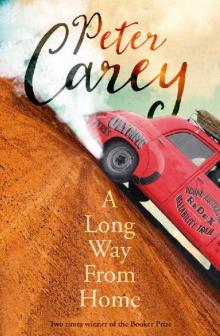 A Long Way From Home
A Long Way From Home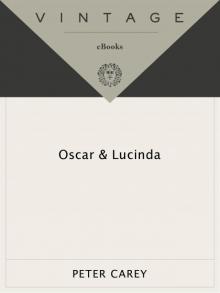 Oscar and Lucinda
Oscar and Lucinda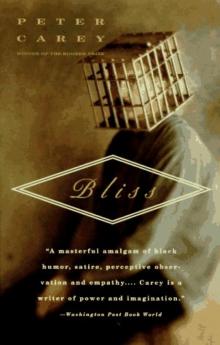 Bliss
Bliss Wrong About Japan
Wrong About Japan The Chemistry of Tears
The Chemistry of Tears The Tax Inspector
The Tax Inspector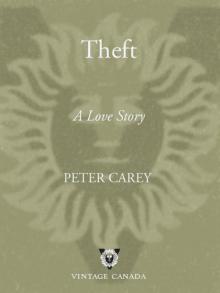 Theft: A Love Story
Theft: A Love Story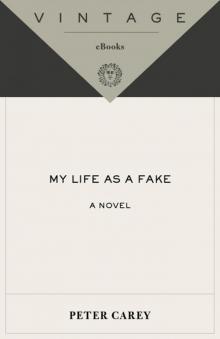 My Life as a Fake
My Life as a Fake Collected Stories
Collected Stories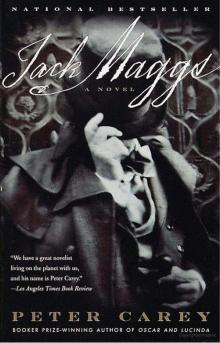 Jack Maggs
Jack Maggs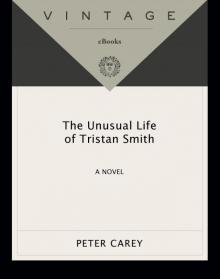 The Unusual Life of Tristan Smith
The Unusual Life of Tristan Smith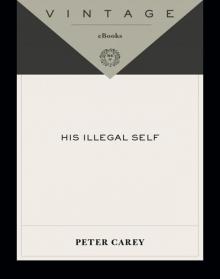 His Illegal Self His Illegal Self His Illegal Self
His Illegal Self His Illegal Self His Illegal Self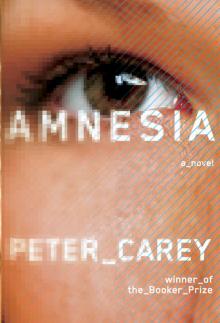 Amnesia: A Novel
Amnesia: A Novel The Big Bazoohley
The Big Bazoohley 30 Days in Sydney
30 Days in Sydney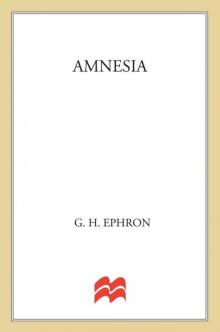 Amnesia
Amnesia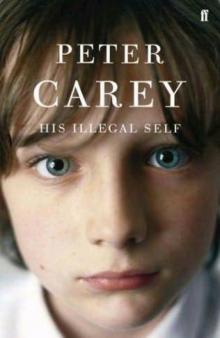 His Illegal Self
His Illegal Self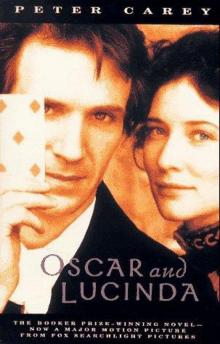 Oscar and Lucinda bw-1988
Oscar and Lucinda bw-1988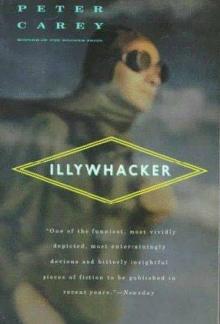 Illywhacker
Illywhacker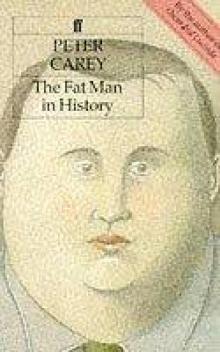 The Fat Man in History aka Exotic Pleasures
The Fat Man in History aka Exotic Pleasures